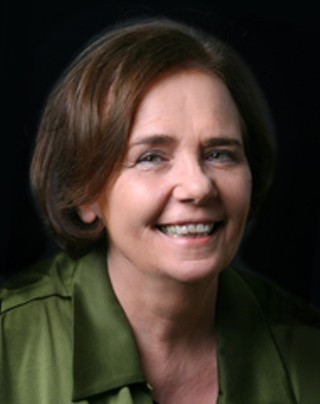Highlights From Gail Collins' Lecture
NYTimes ed delivered the 2013 Liz Carpenter Lecture on Monday night
By Jessi Cape, 5:30PM, Tue. Sep. 10, 2013

A dedicated fan of Buffy the Vampire Slayer reruns, decorated commander of the use of humor in linguistic battle, and pioneer in journalism, Gail Collins enlightened and charmed a full house for the 2013 Liz Carpenter Lecture on Monday evening.
Gail Collins was the first woman to edit the New York Times op-ed page, pens a twice-weekly Times column, co-authors the NYTimes blog The Conversation with David Brooks, and has written six books. Invited by the University of Texas Plan II Honors Program to give the 2013 Liz Carpenter Lecture Series on Monday, Sept. 7, Collins led a rapt and at-capacity Connolly Ballroom audience. (Notably, the 2012 lecture by fellow New York Times columnist Nicholas Kristof was held in the LBJ Auditorium; the smaller venue resulted in an overflow room, where I watched.) Sharing a title with her 2009 book, When Everything Changed: The Amazing Journey of American Women from 1960 to the Present, the talk described the transformation of women's rights, especially pertaining to the workforce and civil issues.
Collins was introduced as a member of the league of such extraordinary women that includes Ann Richards, Liz Carpenter, and of course, Molly Ivins, and she was praised as having "an eye for the major in the minor."
In her less-than-hourlong talk, she shared personal experiences and stories from behind the scenes, tying the memories to a thread of the struggle for equality that generations of women fought so hard to attain. Collins riffed on Lois Rabinowitz – the woman who was expelled from traffic court for wearing pants in 1969 – to explain that that time in American history demonstrates when there are strict rules about what people wear, there are likely strict expectations of how the person should behave. Specifically, stockings, girdles, and a ban on pants represent what was expected of women's behavior in the 1960s. Exemplifying her masterful wit, she said, "Why you would want a woman on a pedestal to be wearing a skirt is unclear."
The airline debacle involving the prohibition of marriage for stewardesses on executive flights – only for men, and complete with steaks and cigars – sent thousands to the women’s movement. Beginning her lecture-long point that the work-home balance is something that still remains a struggle for American families, and women in particular, Collins explained that the only women who could travel for work back then were the stewardesses, but they were not allowed to be married. It would – in theory – deter the executives from flying on the airline if the stewardesses were not single. Of one rebellious stewardess who was found to be married, she joked, “I don’t think they killed her, but they definitely fired her.”
Collins went on to tell many stories, many inspiring shock and awe from the younger audience members and laughter from those who may have witnessed similar experiences. “The great thing about the 1960s was that everything was legal!” she quipped.
Collins used historical events from the past 50 years, many tales now relatively humorous thanks to her comedic delivery, to outline the larger story and shine a spotlight on the work done and the work left to do.
The lecture, and the palpable mood, became more engaged when Collins informed and reminded the audience that life in America began to improve for women when, between 1964 and 1972, the laws were changed, and it became illegal to discriminate against women; that period marked the beginning of many opportunities for women that were never before possible.
Maybe there were exceptions: Liz Carpenter was “way ahead of the time,” for example, but “when you’re an exception to the rule, it basically means that the rule is still the rule. Queen Elizabeth the First: amazing human being! But it didn’t change what happened after [she] left. The rules did not change until suddenly in this very brief period [1960s] there was this transformation. It always just knocks me out that I was there to see this thing,” said Collins.
And when asked, many times apparently, why did the shift occur then, and how did it happen so fast, Collins definitively explained that “one of the reasons, I am absolutely sure, is because of the birth-control pill.”
She explained:
“If the goal was to commit yourself to a career that had a long education process or a long sort of phasing in process with very intense working hours, and you wanted to avoid reproduction completely, for a long period of time, without devoting yourself to perpetual chastity, there was really nothing that was going to work for you in any great way until the birth-control pill came along. As soon as the birth-control pill became readily available, women’s application to medical schools and law schools went through the roof.”
This, of course, also sparked the sexual revolutions, which she joked was “by far the most popular” of the revolutions in that era.
“It was basically not about how often you had sex so much as it was about eliminating the double standard that had existed since the beginning of time – that men could do whatever they wanted to sexually but women had to remain virgins until marriage," Collins said. "It was a huge deal to women."
In addition to the economy, and families' sudden need for a second income, perhaps one of the most influential reasons for the progress and success of the women's movement was the civil rights movement.
“Once the civil rights movement had done its work, and people had absorbed the lessons from the civil rights movement, Americans, I truly believe, became exceptionally sensitive to issues of fairness. … If you can convince Americans, to this day, that something is not fair, you have won the battle. Sometimes this takes quite a while. This is why I’m totally confident that the gay rights movement is gonna do just fine. It’s just the way Americans have come to be and it was the civil rights movement that made that difference. It was just profound.”
Issues of questionable fairness began to shape policies and social dynamics. Collins mentioned that there was a time when authority figures became very insecure, though she quipped, “it probably didn’t happen in Texas – the authority figures in Texas seem quite secure.” When questions of fairness arose, the procedural process reflected more community engagement, as exemplified by the 1968 New York Times trend story about Linda LeClair and cohabitation, which was covered “as if nuclear war is about to be declared.”
Collins said, “Things happened the way they did, as quickly as they did, because there was a generation of women who were not afraid to be laughed at. … Liz Carpenter was among them. Nobody, when the women's movement started, tried to shoot the demonstrators, or sic the dogs – the police dogs – on them, or burn their houses. They just made fun of them. That was the way they got them to stop. …'You must be frigid; you can’t get a man; you must be having your period.’ That was very big.” (One example, and one she wrote about recently in her column, is that of Bobby Riggs and Billie Jean King.)
Collins' conclusion included an admission that surprised many of her listeners:
“Often when I give talks, people ask me questions that are basically an invitation to tell all of the huge enormous barriers I overcame because of my gender during my career, and the truth is, I didn’t have any. And the reason I didn’t, is because I came in one second after the women who filed the suits, who filed the petitions, who got in the faces of their bosses, of the editors, of the administrators, and whoever else was standing in the way. And those women did not get the benefits, in general, of their fight. … All the benefits went to people who came in one second later, like me. I know so many of those women, and they are not bitter … about other people getting the success that they wanted for themselves. They're happy and they're proud and they celebrate it. And that, to me, is the definition of a great heart.”
Collins took audience questions regarding the recent developments at the Harvard Business School, and then briefly contrasted social backlash from the tumultuous 1960s and 1970s versus the modern war on women, of which she said, “It’s a whole different saga now, completely.”
She briefly spoke of women in combat and the average American's desire for an end to the fight about abortion rights, which might require a compromise. Collins wrote the introduction to the 50th anniversary edition of the Feminine Mystique, and “was just wowed by its power. ” She went on to say that though Betty Friedan has been criticized for leaving out poor women and women of color, "[the book's] power is that it’s just a cry of rage from very specific women in a very specific group.” She also discussed asking Gloria Steinem for advice on how to handle audience questions about “Molly” Cyrus.
Regarding the transformation from print to digital, and where that leaves younger journalists, Collins said, “It’s a really hard time – a really, really hard time – for young journalists, but it’s a really exciting time. Because here’s what's happening that really amazes me: I firmly believe that when you have a drastic change in the way people write – that is the physical way people write – you went from quill pens to fountain pens to manual typewriters to computers – every time one of those changes happens, it changes not just the facility with which you write, it changes the writing itself.”
The span from New York Times papers in the 1920s to modern computer editing means the current way of reporting is “easier to read, more clear, more lively, but less dense,” she said.
“The next generation of journalists will not just be pioneering, somehow, new forms of journalism – which, God help us, I hope we get community journalism back where it needs to be in this country – but … you're going to change the way people write … the way people communicate … not just the method, but the way it sounds, the thinking that goes from your head to someone else's head.”
Wrapping it up, she mentioned her colleague, Nicholas Kristof, and his book with wife Sheryl Wu-Dunn, Half the Sky, to answer a question about the empowerment of women being the key for positively transforming the Middle East, and the Muslim world. And last, to thunderous applause, Gail Collins hit the ball out of the park when asked about the gender disparity in politics. She said, “Many people argue that women are just not temperamentally suited for such a crazy and insane profession as politics, as it is today in America. But ol’ Wendy Davis, I think, proved that that is not the case.”
And just before Gail Collins was presented with a 75th anniversary pin making her an Honorary Alum of Plan II, she said, “You have exciting things coming in Texas.” Indeed.
A note to readers: Bold and uncensored, The Austin Chronicle has been Austin’s independent news source for over 40 years, expressing the community’s political and environmental concerns and supporting its active cultural scene. Now more than ever, we need your support to continue supplying Austin with independent, free press. If real news is important to you, please consider making a donation of $5, $10 or whatever you can afford, to help keep our journalism on stands.
Katarina Brown, Aug. 23, 2017
Marjorie Baumgarten, April 22, 2017
April 12, 2024
March 14, 2024
University of Texas, Gail Collins, New York Times, NIcholas Kristof, Plan II Honors Program, Betty Friedan, Feminine Mystique, Linda LeClair, Wendy Davis, Ann Richards, Liz Carpenter, Molly Ivins, Buff the Vampire Slayer, Gloria Steinem










